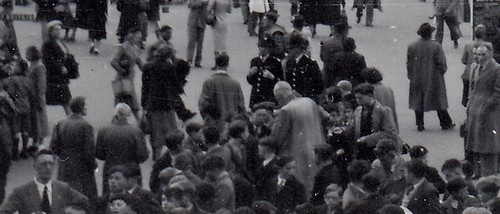
I thought I'd get in early for this week's Sepia Saturday theme, which is expositions. This is the 1951 Festival of Britain, held in London on the South Bank of the Thames and still fondly remembered as the symbolic end of post-war economic austerity. The 'Dome of Discovery' on the left and the 'Skylon' tower, both demolished after the festival. Looking closer you can see a group of school boys watched over by a stern teacher and two policemen.
A bit of trivia: one of the consulting engineers on the Dome was Oleg Kerensky, son of former revolutionary Russian Prime Minister, Alexander Kerensky.
For another photo on the theme of expositions see this one I posted a while back.

I went to the Festival of Britain but don't remember much about it. I can say that is not my school in the photograph.
ReplyDeleteThese are great. I have a few vintage postcards of earlier festivals, e.g. the 1908 Franco-British exhibition, but oddly not any of this later one ... although pretty sure I have some stamps related to it somewhere.
ReplyDelete@Bob ScotneyDid you go inside the Dome of Discovery?
ReplyDeleteJust before my time, as they say, but fascinating nonetheless. It looked pretty crowded!!
ReplyDeleteThe skylon is impressive. I read the explanation of the principles but didn't really understand.
ReplyDeleteWow! Very interesting. Too bad that they tore the dome and tower down. That is neat that Bob was there also.
ReplyDeleteHappy SS,
Kathy M.
Nice picture! I guess they like to have domes in London, isn't it.
ReplyDeleteThe people are almost as interesting as the exhibition buildings, don't you think? They'd need more than one teacher for all those boys these days, I fear.
ReplyDeleteLooks like one boy behind the teacher may be planning to make a break for freedom.
ReplyDeleteFor some reason it reminds me of Tomorrow Land in the original Disneyland.
ReplyDeleteI wish I'd been to a World's Fair.
@Tattered and Lost The comparison with Tomorrow Land is quite apt. Disneyland was completed only four years after the Festival of Britain when the same 'futuristic' modernism was in vogue.
ReplyDelete